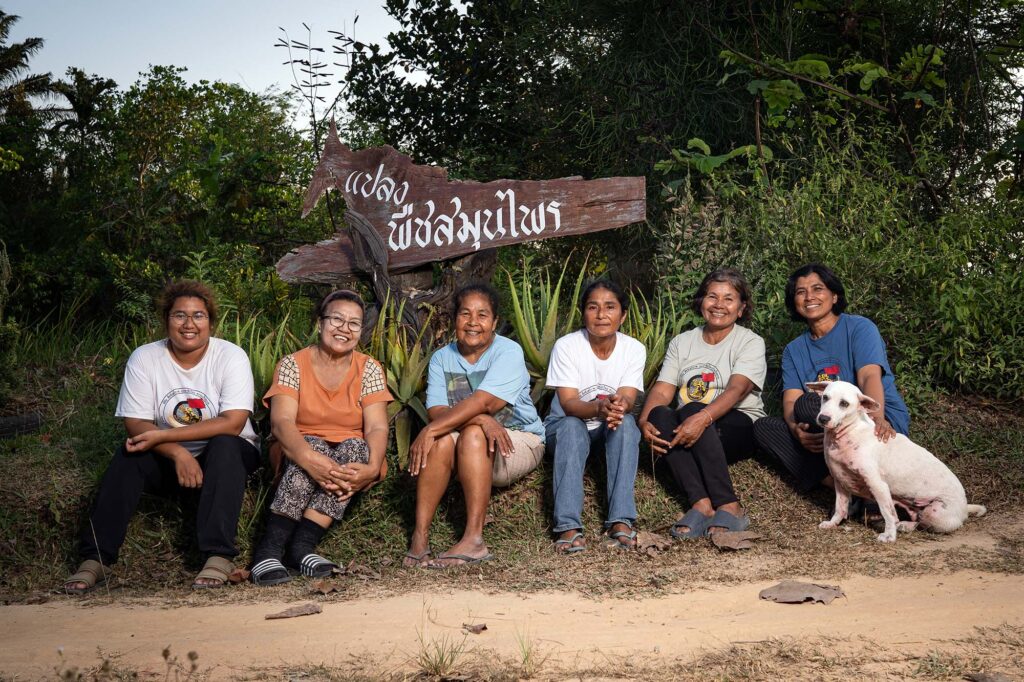Southern Peasants Federation of Thailand

Indigenous- and Peasant-led Collective Land Management
The Milestone
In March 2021, Southern Peasants Federation of Thailand (SPFT) won an eight-year long landmark case against the United Palm Oil Industry, where the Thai courts ordered the revocation of land titles illegally granted to palm oil companies. In addition, the Thai government officially granted permission to SPFT to manage their lands under the Chanot Chum Chon (CLT) model. CLT is an innovative approach to collective land management and achieving food sovereignty. The model has become a beacon of inspiration for numerous communities, drawing many visitors, including peasants, parliamentarians and national human rights institutions from across Asia, to learn more.
Why This Matters
In Thailand, the bottom 50% of the population possesses only 5% of the country’s land, so the majority of Thai peasants do not own land. Concurrently, there is a rising demand for land from the global palm oil industry. The Thai government has met this demand by granting corporations numerous long-term leases—some extending up to 30 years or more—for so-called public, state-owned lands without proper public consultation or environmental assessment. Meanwhile, as SPFT members continue to struggle for land, they have been met with intimidation, violence, and assassination.
Movement Action
SPFT has successfully applied CLT’s practice of people-owned community land title on public lands, providing land to landless peasants in four communities. They have exceeded what some SPFT leaders saw as the shorter-term vision of the organization, which focused on land occupation and production, and now are working towards their longer-term vision, which includes securing land rights and establishing self-determined democratic governance models in their communities.
As a result of SPFT’s work, more than 500 landless peasants and wage laborers practice community land management and agroecology for their sustenance and livelihoods. SPFT has successfully challenged the top-down, state-led, centralized development model in Thailand, which has favored market actors. SPFT has become a key learning center on collective land management in Thailand and has met with members of the Thai parliament, the National Human Rights Commission of Thailand, and social movements from Thailand, Cambodia, and the Philippines.
How They Are Doing It
Strategic Litigation: Despite the expiration of leases, palm oil companies persisted in farming the lands they had acquired from the government. In a landmark legal victory, SPFT community members challenged this situation and emerged victorious, compelling the government to transfer access to these lands back into the hands of Indigenous communities.
Community Land Management Model: SPFT’s unique community-led collective land management model, known as Chanot Chum Chon (CLT) in Thai, prioritizes environmental stewardship and local food production over unsustainable uses like palm oil plantations. Under CLT, forests are collectively managed and once barren landscapes devastated by palm oil have been transformed into thriving spaces that yield food, forests, farms, seeds, and foster community growth.
Agroecology School and Practices: In SPFT’s model, each landless family receives four acres of land for crops and half an acre for a home, with the condition of practicing agroecological food production. SPFT members now use agroecology practices to farm rice, galangal, ginger, lemongrass, and pumpkins. They are revitalizing their water system to use less energy. To preserve Indigenous practices, SPFT manages seed banks for local vegetables and rice, and opened herbal cultivation areas to practice herbal medicine. Through these efforts, 200 members of SPFT, including youth and women, are joining agroecology efforts.
Cooperatives: The central cooperative at SPFT offers financial services to members, support in procuring agricultural and production needs, and marketing of agroecologically produced products, among other services. The cooperative is working to create a landbank fund for purchasing land from the Government’s Land Bank Administration Institute in order to make it available for collective use by SPFT members. The cooperative operates many branches across different communities.
Political and Human Rights Education: SPFT provides political education and technical training to community members on various issues such as democratization, self-determination, alternatives to neoliberal capitalism, and technical aspects related to cooperatives and agriculture.
Movement Building, Campaign, and Advocacy: SPFT builds solidarity and collective campaigns with cross-movement actors such as the pro-democracy, Indigenous Peoples, and young people’s movements with the goal of strengthening food sovereignty, accelerating land reforms, implementing CLT nationally and creating a national land bank for landless people.
Thousand Currents Partnership
Beyond traditional land access, SPFT’s work includes broader efforts towards governance, intergenerational sharing, and transformative leadership models through a gendered analysis. Given that SPFT members have faced mounting military and corporate-led aggression, this partnership is also providing insights on violence that human rights defenders face in their struggles for agrarian and climate justice. Thousand Currents will continue to resource and amplify their work while also learning from them.
All Case Studies
Aliansi Masyarakat Adat Nusantara
Bufete para Pueblos Indígenas
Kenyan Peasants League
Nous Sommes La Solution
Thousand Currents Partnership Model
